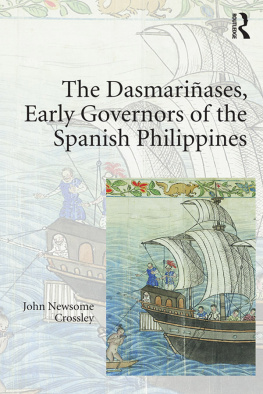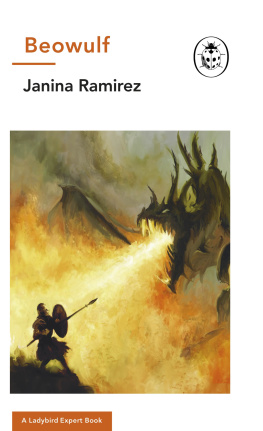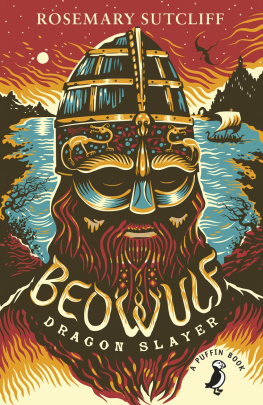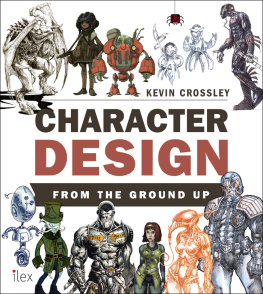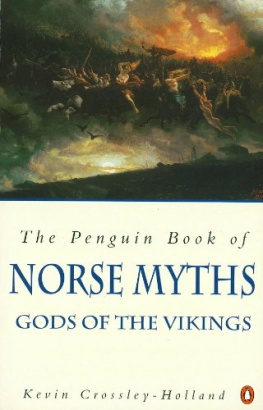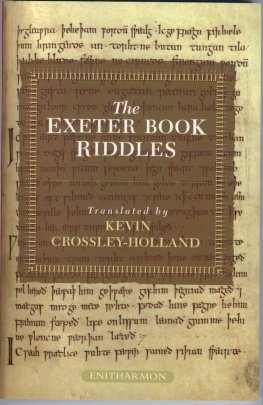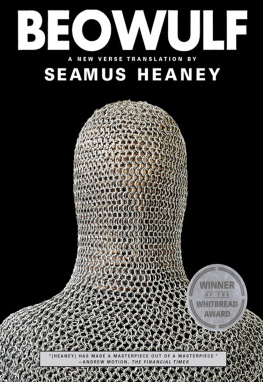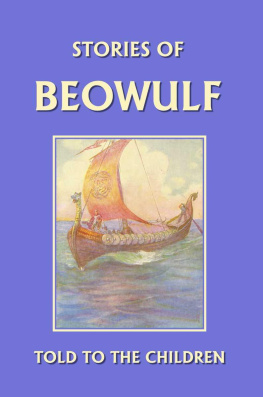Crossley-Holland Kevin - Beowulf ; Tthe fight at Finnsburh
Here you can read online Crossley-Holland Kevin - Beowulf ; Tthe fight at Finnsburh full text of the book (entire story) in english for free. Download pdf and epub, get meaning, cover and reviews about this ebook. City: UK;New York;Oxford, year: 1999, publisher: Oxford University Press, genre: Religion. Description of the work, (preface) as well as reviews are available. Best literature library LitArk.com created for fans of good reading and offers a wide selection of genres:
Romance novel
Science fiction
Adventure
Detective
Science
History
Home and family
Prose
Art
Politics
Computer
Non-fiction
Religion
Business
Children
Humor
Choose a favorite category and find really read worthwhile books. Enjoy immersion in the world of imagination, feel the emotions of the characters or learn something new for yourself, make an fascinating discovery.

- Book:Beowulf ; Tthe fight at Finnsburh
- Author:
- Publisher:Oxford University Press
- Genre:
- Year:1999
- City:UK;New York;Oxford
- Rating:5 / 5
- Favourites:Add to favourites
- Your mark:
- 100
- 1
- 2
- 3
- 4
- 5
Beowulf ; Tthe fight at Finnsburh: summary, description and annotation
We offer to read an annotation, description, summary or preface (depends on what the author of the book "Beowulf ; Tthe fight at Finnsburh" wrote himself). If you haven't found the necessary information about the book — write in the comments, we will try to find it.
Beowulf ; Tthe fight at Finnsburh — read online for free the complete book (whole text) full work
Below is the text of the book, divided by pages. System saving the place of the last page read, allows you to conveniently read the book "Beowulf ; Tthe fight at Finnsburh" online for free, without having to search again every time where you left off. Put a bookmark, and you can go to the page where you finished reading at any time.
Font size:
Interval:
Bookmark:
OXFORD WORLDS CLASSICS
BEOWULF
THE poet of Beowulf is unknown to us, but he was an Anglo-Saxon, almost certainly a Christian, and perhaps a cleric. The main action of the poem is set in early sixth-century Scandinavia, and the earliest likely date for its composition is about 150 years later, the middle of the seventh century, when Christianity was beginning to spread throughout Anglo-Saxon England. Scholars now tend to place the poems composition at some time in the late eighth or ninth century. The dating of the single manuscript in which the poem is found to the very beginning of the eleventh century provides us with the latest possible date for the poem. Beowulf is written in Old English, in the standard alliterative four-stress line common to all Anglo-Saxon poetry. The language of the original gives us little clue as to where in Anglo-Saxon England it was composed. Even though the poem bears some of the characteristics of oral compositionespecially in its use of formulaeit seems likely that its composition was literary, though it was probably designed for oral recitation. There are no explicit references to Christianity, but there is a good deal of biblical allusion, especially to the Old Testament. The poem is also rich in allusions to the legendary world of Germanic heroism and Scandinavian history which we know mainly from Old Norse sources. Epic in length, style, and subject matter, Beowulf is also profoundly elegiac in tone, depicting a long-past world of monsters, heroes, and kings.
KEVIN CROSSLEY-HOLLAND is editor of The Anglo-Saxon World (Oxford Worlds Classics), translator of The Exeter Book Riddles, and author of The Penguin Book of Norse Myths. He has written seven volumes of poetry and is a Carnegie Medal-winning writer for children. He is a Fellow of the Royal Society of Literature.
HEATHER ODONOGHUE is Vigfusson Rausing reader in Old Norse-Icelandic Literature in the University of Oxford, and a fellow of Linacre College. She is the author of The Genesis of a Saga Narrative: Verse and Prose in Kormaks saga (OUP) and works particularly on the links between Old Norse, Old English, and Irish literature.
OXFORD WORLDS CLASSICS
For over 100 years Oxford Worlds Classics have brought readers closer to the worlds great literature. Now with over 700 titlesfrom the 4,000-year-old myths of Mesopotamia to the twentieth centurys greatest novelsthe series makes available lesser-known as well as celebrated writing.
The pocket-sized hardbacks of the early years contained introductions by Virginia Woolf, T. S. Eliot, Graham Greene, and other literary figures which enriched the experience of reading. Today the series is recognized for its fine scholarship and reliability in texts that span world literature, drama and poetry, religion, philosophy, and politics. Each edition includes perceptive commentary and essential background information to meet the changing needs of readers.
Refer to the to navigate through the material in this Oxford Worlds Classics ebook. Use the asterisks (*) throughout the text to access the hyperlinked Explanatory Notes.
OXFORD WORLDS CLASSICS

The Fight at Finnsburh

Translated by
KEVIN CROSSLEY-HOLLAND
Edited with an Introduction and Notes by
HEATHER ODONOGHUE


Great Clarendon Street, Oxford OX2 6DP
Oxford University Press is a department of the University of Oxford.
It furthers the Universitys objective of excellence in research, scholarship,
and education by publishing worldwide in
Oxford New York
Athens Auckland Bangkok Bogot Buenos Aires Calcutta
Cape Town Chennai Dar es Salaam Delhi Florence Hong Kong Istanbul
Karachi Kuala Lumpur Madrid Melbourne Mexico City Mumbai
Nairobi Paris So Paulo Singapore Taipei Tokyo Toronto Warsaw
with associated companies in Berlin Ibadan
Oxford is a registered trade mark of Oxford University Press
in the UK and in certain other countries
Published in the United States
by Oxford University Press Inc., New York
Translation Kevin Crossley-Holland 1999
Editorial matter Heather ODonoghue 1999
The moral rights of the author have been asserted
Database right Oxford University Press (maker)
First published as an Oxford Worlds Classics paperback 1999
All rights reserved. No part of this publication may be reproduced, stored in a retrieval system, or transmitted, in any form or by any means, without the prior permission in writing of Oxford University Press, or as expressly permitted by law, or under terms agreed with the appropriate reprographics rights organizations. Enquiries concerning reproduction outside the scope of the above should be sent to the Rights Department, Oxford University Press, at the address above
You must not circulate this book in any other binding or cover
and you must impose this same condition on any acquirer
British Library Cataloguing in Publication Data
Data available
Library of Congress Cataloging in Publication Data
Beowulf. English
Beowulf; The fight at Finnsburh / translated by Kevin Crossley
Holland; edited with an introduction by Heather ODonoghue.
(Oxford worlds classics)
1. English poetryOld English, ca. 4501100Modernized versions.
2. Epic poetry, English (Old). I. Crossley-Holland, Kevin.
II. ODonoghue, Heather. III. Fight at Finnesburg (Anglo-Saxon
poem). English. IV. Title. V. Series: Oxford worlds classics
(Oxford University Press)
PR1583.C76 1999 829.3dc21 9822104
ISBN 019283320-0 (pbk.)
Typeset by Graphicraft Limited, Hong Kong
Printed in Great Britain by
Clays Ltd, St Ives plc
Beowulf is an Anglo-Saxon poem about Scandinavian characters and events in a half-legendary, half-historical Germanic past. Its lengthover 3,000 linesits subject mattera hero fighting against the forces of evil in a world of vicious power struggles between tribes and kingdoms in early Northern Europeand its abiding concernsthe dignity of human conduct and the value of heroic societyidentify it at once as an epic poem, and specifically, heroic epic. Epic poetry has been described as an expression of a societys cultural heritage and certainly, in its breadth of reference and the grandeur of its ethical conception, Beowulf has always been viewed as the defining text of the Anglo-Saxon world. But, in common with Homeric epic, Beowulf does not slot into any clear historical or social context. We do not know when or where in Anglo-Saxon England it was composed; whether it had an oral prehistory; what kind of author it had. We can only guess how its contemporaries regarded it, and who its audience might have been. Most tantalizingly, we do not know whether its picture of heroic life reflects reality, or literary tradition, or is the poets own invention; some of the events and characters in the poem have their basis in historical fact, while others, including the monsters, and the hero Beowulf himself, belong to a wholly different order of reality, the mythic or legendary.
The poem tells the story of how its hero, Beowulf, gains renown by coming to the aid of Hrothgar, King of the Danes, killing first a terrifying humanoid monster, Grendel, and then the monsters infuriated, vengeful mother. Beowulf eventually becomes king of his own country, Geatland, but when he is old (as Hrothgar was when Beowulf came to kill Grendel) Geatland itself is threatened by a monstera fiery dragon which Beowulf fights and kills, dying in the process. With the death of Beowulf comes another, different threat to the Geatish people: without their king, they will be vulnerable to attack from old enemies, and the poem ends with a lament for Beowulf which is also a lament for the future of the Geatish people and, by extension, an elegy for heroic society as a whole.
Next pageFont size:
Interval:
Bookmark:
Similar books «Beowulf ; Tthe fight at Finnsburh»
Look at similar books to Beowulf ; Tthe fight at Finnsburh. We have selected literature similar in name and meaning in the hope of providing readers with more options to find new, interesting, not yet read works.
Discussion, reviews of the book Beowulf ; Tthe fight at Finnsburh and just readers' own opinions. Leave your comments, write what you think about the work, its meaning or the main characters. Specify what exactly you liked and what you didn't like, and why you think so.

